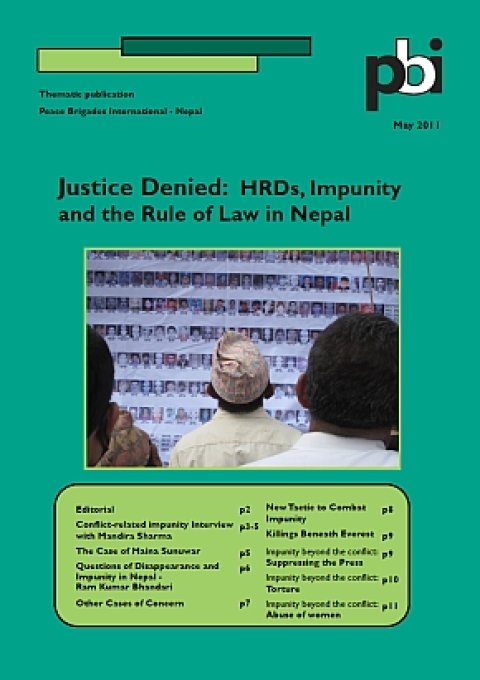Publikation

Justice Denied: HRDs, Impunity and the Rule of Law in Nepal
It is a fact that, 5 years after the end of the conflict, not one single perpetrator of a conflict-era human rights violation has been brought to justice in a court of law. But Nepal‟s impunity has further implications than conflict-era prosecution simply being „on hold‟. Impunity for crimes has continued to the present day. Torture in state detention facilities is endemic and extremely difficult to prosecute (see page 10). Political interference in the application of law further weakens rule of law. Non-implementation of court orders makes a mockery of jus-tice (see cases on page 7). In such an environment, human rights defenders, journalists and victims who continue to raise cases and concerns are placed in a position of confrontation each time they do so. (…)
Throughout this publication, we take a closer look at impunity, the weak rule of law and the effects that these have on some of the HRDs with whom PBI works. These HRDs speak about the root causes of impunity and its effect on their day to day work, including height-ened risk for defending rights. They speak of the methods they use to try and improve the situation. There are clear links between the work of human rights defenders and the end of impunity. Without protection mechanisms, including strong rule of law and an engaged police force, HRDs remain vulnerable.
Table of Content
Conflict-related impunity, Interview with Mandira Sharma
The Case of Maina Sunuwar
Questions of Disappearance and Impunity in Nepal -Ram Kumar Bhandari
Other Cases of Concern
New Tactic to Combat Impunity
Killings Beneath Everest
Impunity beyond the conflict: Suppressing the Press
Impunity beyond the conflict: Torture
Impunity beyond the conflict: Abuse of women